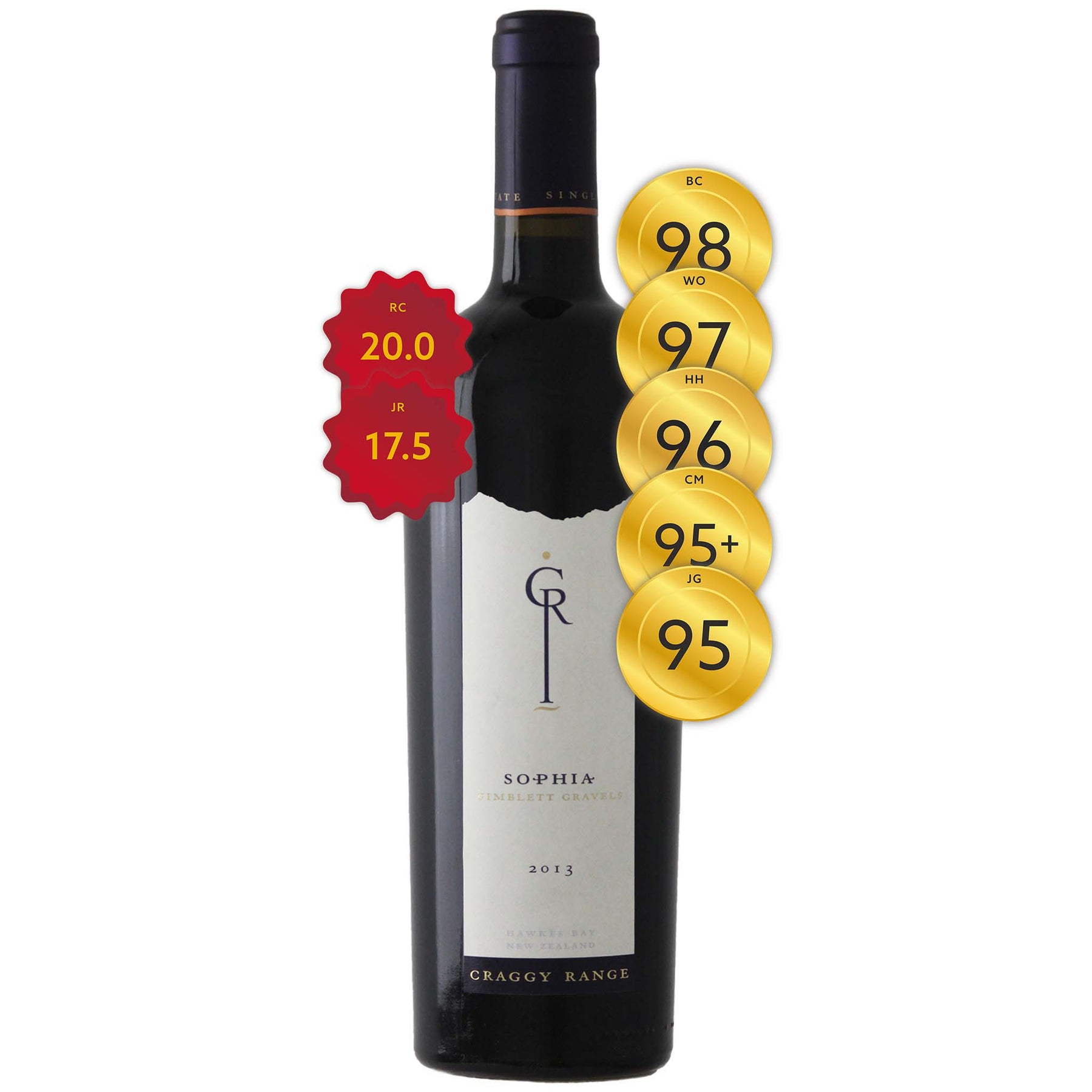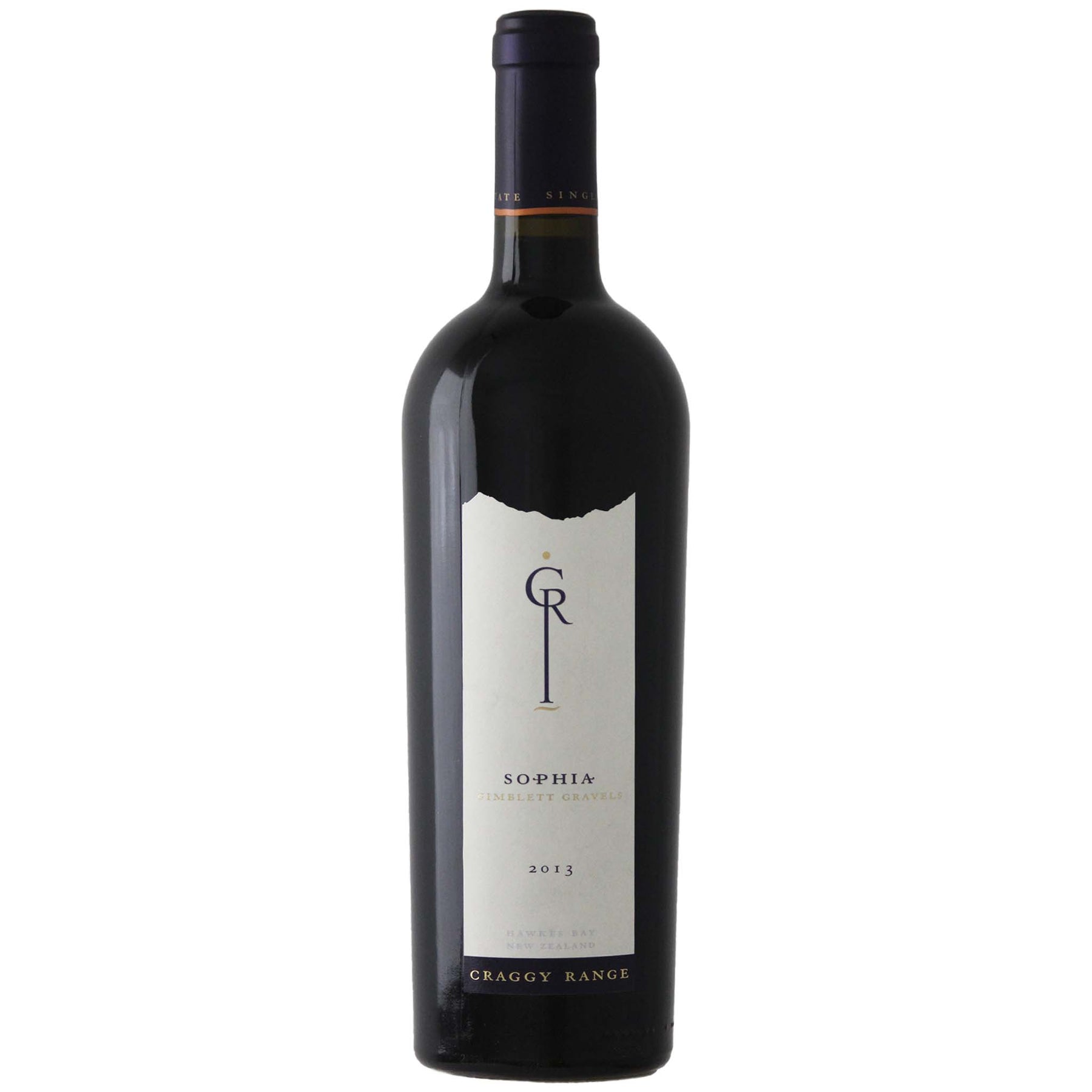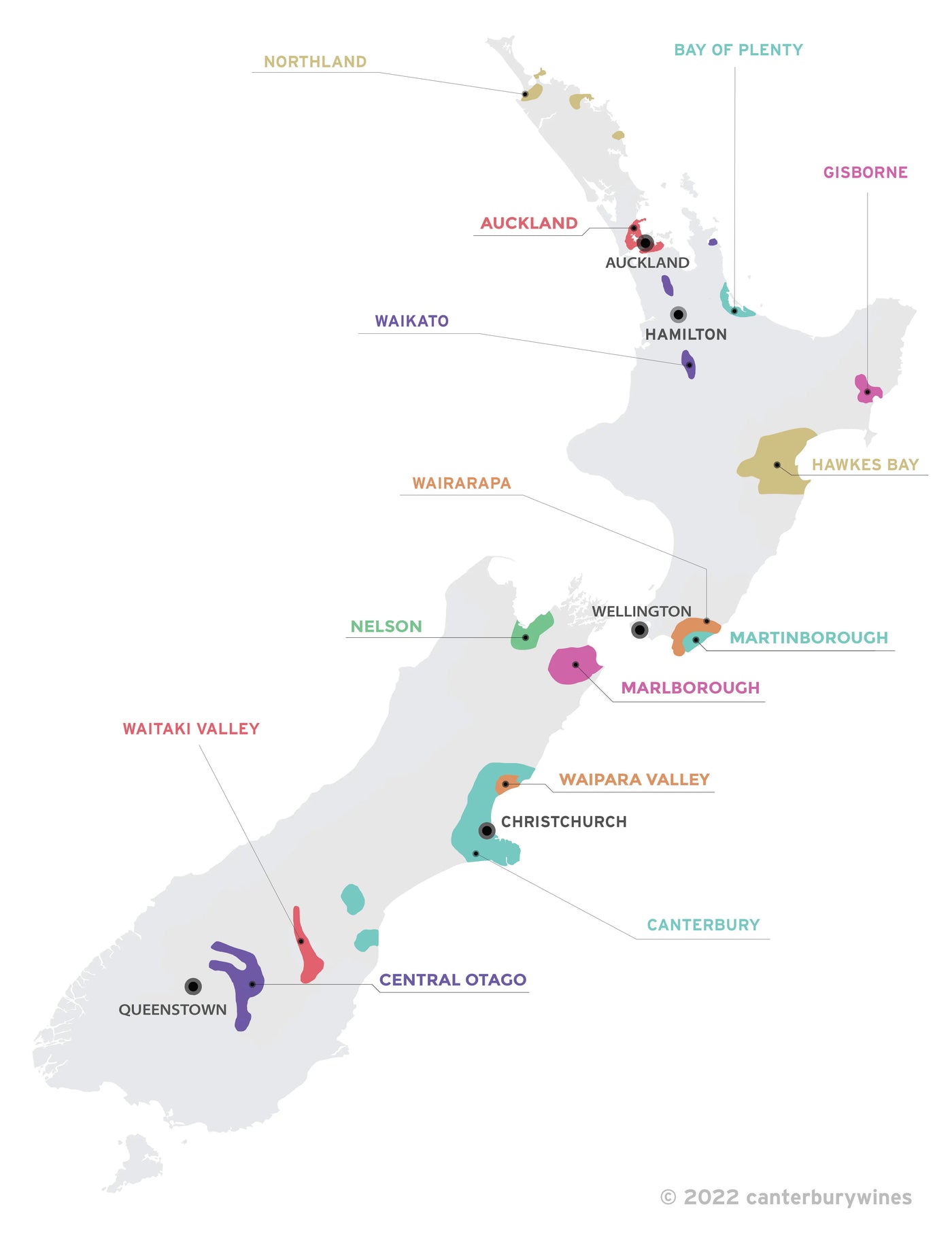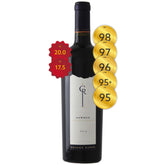

Craggy Range Sophia Merlot Cabernet Franc 2013
Style: Red Wine
Closure: Screwcap
Craggy Range Sophia Merlot Cabernet Franc 2013
Warehouse
34 Redland Drive
Vermont VIC 3133
Australia
Critic Score: 20/20 and 98
Alcohol: 13.5%
Size: 750 ml
Drink by: 2035
Sophia is Craggy Range's flagship wine, a Bordeaux blend sourced from their best parcels of Merlot, Cabernet Sauvignon and Cabernet Franc in the famous Gimblett Gravels vineyard. The wine is made at the Giants Winery complex in a specially designed circular fermentation cellar containing 8000 litre French oak cuves. Each of the cuves is used for fermenting the Merlot, Cabernet Sauvignon, Cabernet Franc, Malbec and Petit Verdot parcels of wine that come from the Gimblett Gravels Vineyard. Below the Sophia cellar is an underground barrel cellar named The Quarry where the blended components of Sophia are aged together for its final 12 months.
"A complex array of flavours on the palate including plum, dark berry, chocolate, spice and a hint of violet. Gorgeous wine with plenty of weight, a silken texture and real energy. Will be very long-lived." Bob Campbell MW
The grapes for the 2013 Sophia were all destemmed and fermented with selected yeast in closed French oak cuves (nothing but the best) before being aged for 19 months in French barriques, of which 42% were new. The wine was not fined but was lightly filtered.
Expert reviews
Very dark, deep, black-hued ruby-red with a youthful purple rim. The nose is very elegantly proportioned and tightly concentrated with aromas of ripe blackberry fruit entwined with black plums and blackcurrants. The aromatics show beautiful clarity and fragrance with lifted red and black fruits, along with fragrant spices, oak and smoke notes. This has great depth, intensity and finesse. Medium-full bodied, rich, sumptuous and luscious layers of ripe black plum and blackberry fruit are lifted by blackcurrants and sweet herbal notes, with fragrant red fruit, leaf and floral elements. The fruit is enhanced by nuances of spice and subtle oak richness. The wine is driven along with a very refined core of extraction, with elegance of structure and grip, and excellent linearity, the sweetness enlivened by juicy, ripe acidity. This has the perfect balance of freshness, vitality and mouthwatering richness, the flavours carrying through to a very long finish. This is a wonderfully elegant, sweetly rich, vibrantly refreshing Sophia, with refined structure and the balance to age 10-15 years. Serve with roast lamb, beef, venison, and with semi-hard cheeses. A blend of 62% Merlot, 19% Cabernet Sauvignon, 18% Cabernet Franc and 1% Petit Verdot from the 'Gimblett Gravels vineyard, fermented to 13.8% alc., the wine aged 19 months in 42% new French oak barriques." Raymond Chan – 20.0/20 points ★★★★★
"A blend of Merlot, Cabernet Sauvignon, Cabernet Franc and Petit Verdot. Lifted aroma with pronounced plum and floral characters. A complex array of flavours on the palate including plum, dark berry, chocolate, spice and a hint of violet. Gorgeous wine with plenty of weight, a silken texture and real energy. Will be very long-lived. Drink 2016-2028." Bob Campbell MW - 98 points
"It was exciting and impressive to taste individual components but the blend is spectacular. Breathtaking fragrance and complexity - dark fruits, floral, spice and dried herbs with whispering cedary undertone. It's an undeniably concentrated and structured wine. Immensely appealing on the front palate, seamless and seductive through the middle, and exceptionally long and delicately drying at the end. A beautifully composed wine of enormous potential." Sam Kim, Wine Orbit – 97 points
"Deep red colour with a strong purple tint. The bouquet is big on dried herbs and blackcurrant, reminding more of cabernet than merlot perhaps, the palate lush in blackberry, cassis fruit and soft, fine-grained tannins. The fruit ripeness is spot-on. A very stylish, polished red blend of superb balance and refinement. Drink: 2018-2038." Huon Hooke, The Real Review - 96 points
"They're crowing about the 2013 vintage at Craggy Range. A fine-grained wine. It's as if it's been deep-etched with a fine tip. It's powerfully built, minerally, chocolatey, sluiced with gravel and blackcurrant, and lifted by a variety of florals. Feels both water- and alcohol-based. 'Sophia” always smells of money; this release does too, but the cash hangs out the top of the wallet, rather than being flashed around. A rumble of tannin leads the flavours into the future. A long termer, without question. Drink: 2013-2030+." Campbell Mattinson, The Wine Front – 95+ points
"This is a Bordeaux-style blend with 62% merlot, 19% Cabernet Sauvignon, 18% Cabernet Franc and 1% Petit Verdot. Yield 48 hl/ha, inoculated, aged 19 months in French oak, 42% new. 13.8% alcohol. Beautifully perfumed nose of floral red cherries, plums and blackcurrant, with a subtle fine spiciness. The palate has superbly balanced sweet cherries and black fruits. It has presence and concentration but it's also quite understated, with fine-grained tannins and a fresh, dynamic personality. So fine, this has massive potential." Jamie Goode – 95 points
"I don't often choose wines as relatively expensive as this one as my wine of the week but I was so struck by the sheer quality of this vintage of Sophia, the top Bordeaux blend from New Zealand's most lavishly appointed that I wanted to draw attention to it.
I tasted it at home and wrote about this sophisticated but generous antipodean answer to Pichon Lalande. Bright crimson and very bright fruit that is very beautiful and beautifully balanced. Super-ripe but not sweet. Much fresher than the too-heavy bottle suggests. Really very accomplished. Long and neat. Really lovely wine that lasted well in an opened bottle – A Good Sign. Jancis Robinson MW – 17.5/20 points and Wine of the Week
The vineyards
We took an innovative position of pursuing a multi-regional approach to wine growing meaning we didn't have to compromise. After discovering the promise of New Zealand, the Peabody family decided on the Gimblett Gravels Winegrowing district in Hawke's Bay and Te Muna Road in Martinborough to produce a collection of wines that speak very much of their place.
Gimblett Gravels

A place of warmth and gravelly soils, the Gimblett Gravels Winegrowing District resulted from a flood in 1876 when the Ngaruroro River changed its course and a vista of gravel was left behind. The area is a place of warmth, stone and sandy alluvial soils. This unique combination alongside other climatic factors such as sunshine hours, humidity and rainfall means the gravels retain heat and lead to optimum ripening for Syrah, Merlot and Cabernet. The characteristics of red wines from the vineyard are richness, ripeness and elegance with a distinctive fine dusty tannin finish. Chardonnay is also grown on the vineyard with distinctive floral notes and pronounced minerality on the palate.
Te Muna Road

The Te Muna Road Vineyard is located some 7 kilometres outside of the Martinborough township. The vineyard consists of two distinct terraces, the higher comprising very old, stony clay-infused soils perfect for Pinot Noir. The lower terrace of younger stony soils interleaved with limestone provides an excellent environment for Sauvignon Blanc. The cooler climate of Martinborough ensures the wine is aromatic with steely minerality while the rocky soils give intensity to the fruit. The region's warm, dry summers and mild winters have led to complex and structured wines with subtle aromatics and an elegant finish.
Kidnappers Vineyard

Our Kidnappers Vineyard is located on the Hawke's Bay coastline at Te Awanga where the spring and autumn are warm and sunny and the summer is tempered by the cooling sea breeze. Its ideal location allows the development of intense Chardonnay flavours in the grapes producing a wine with lifted aromatics and a mouth-watering finish.
The craggy range story

When Terry Peabody arrived home from a four-week business trip in the fall of 1993 his wife Mary, and daughter Mary-Jeanne, cooked him dinner. The meal was long and leisurely, but not without purpose. Terry wasn't allowed to leave until he had agreed to go into the wine business. The specification was that the business must never be sold. It was to be a family business, an enduring heritage legacy.
That night, Terry made a commitment to the most important people in his life, and he intended to honour it. The search for a winery began traditionally enough - in France and America, spreading then to Australia. Other business brought him to the edge of the world, to New Zealand: a land of mountains, fire and ice - geographically the youngest country in the world – situated in the sweet latitudes for winegrowing.
'When I pictured a life among the vines, I didn't immediately think of New Zealand, but New Zealand was wonderful because we were interested in clean air, green fields and a culture of care for the land. We didn't want to inherit or extend other people's mistakes.' Mary Peabody
Terry had always been impressed with the quality of New Zealand wines and he sensed a new and exciting possibility. In New Zealand he saw potential he hadn't seen elsewhere. The country's exceptional climate, the youth of the wine industry and the pioneering spirit of the people aligned with his own philosophy and desire to cut a different path. His ambition was not merely to buy into an existing vineyard or to emulate the greatest examples of wine styles in the world - it was bolder. He wanted to create new benchmarks with wines that would become internationally known as the New World classics.
Fate played its part. An acquaintance introduced Terry to noted Kiwi viticulturist Steve Smith, who had been named by Decanter magazine as 'one of the 50 most influential people in the world of wine going into the next millennium.' He was in good company alongside Chateau Margaux's Paul Pontallier, Pierre Henry Gagey of Louis Jadot, and Jancis Robinson MW. He'd just become a Master of Wine - the only specialist viticulturist in the world to have the distinction.
As some collect antiquities or vintage cars, Steve collected land for vintages. A consultant with a rare instinct, and experience in South Africa and Bordeaux, he received more than 350 parcels of wine annually from all over New Zealand. He saw that some pieces of land came through with distinction every time and he'd pinpointed some special places. Gimblett Gravels in Hawke's Bay on the east coast of New Zealand was an area with the perfect growing conditions for his favourite wines – the Bordeaux reds and particularly Syrah. The spectacularly beautiful Tuki Tuki Valley had the soil for Chardonnay and would be the ideal home base from which to build a new kind of winery.
Steve, who always wanted to stretch the boundaries and to whom 'it's nice' would be the ultimate insult about a wine, joined Terry. They made an important decision from the beginning to exclusively pursue the Single Vineyard Philosophy of winemaking – fresh thinking back in 1997. They took an innovative position of pursuing a multi-regional approach to wine growing meaning they didn't have to compromise. After discovering the promise of New Zealand, the Peabody family decided on the Gimblett Gravels Winegrowing district in Hawke's Bay and Te Muna Road in Martinborough to produce a collection of wines that speak very much of their place. Craggy Range was the first in the Southern Hemisphere to adopt making single vineyard wines from multiple regions of the country. Grape was matched to place.
About the winery

Craggy Range is a family-owned winery situated in the shadow of the spectacular Te Mata Peak in the premium wine growing area of Hawke's Bay. It was established in 1998 by Terry Peabody and his wife Mary to create a family legacy, one that could be handed down to future generations. To honour their pledge to the family they established a 1000 year trust, meaning the winery can never be sold.
Their search for a winery began traditionally enough, in France and America then spreading to Australia. An opportunity then brought Terry to New Zealand. Here he saw the potential he hadn't seen elsewhere – the country's exceptional climate, a rich history in farming the land and the pioneering spirit of the people.
It was here that Terry Peabody was introduced to noted Kiwi viticulturist Steve Smith, and together they sought out the best sites in this relatively young country with the ambition of being recognised as one of New Zealand's iconic wine producers. And so they settled on the Gimblett Gravels Winegrowing district, an ancient river bed of the Ngaruroro River in Hawke's Bay. The Gimblett Gravels are the perfect place to grow Syrah, Merlot and Cabernet, as the gravels retain heat which aids ripening.
They then took their search to Martinborough, and more particularly, a spectacular piece of farmland in Te Muna Road. It has two distinct terraces, the higher comprised of very old rocky clay-infused soils that are perfect for growing Pinot Noir. The lower terrace of younger gravelly soils interleaved with limestone allows for a unique style of aromatic, minerally Sauvignon Blanc.
As the vineyards have matured over the years so have the wines. The winery was recognised in 2014 by renowned US publication Wine Enthusiast as ‘New World Winery of the Year'.
The wines of Craggy Range are produced at two sites, the Gimblett Gravels Winery and Giants Winery (refer to the map below). Most of the Craggy Range wines are made at the Gimblett Gravels Winery located in the heart of the Gimblett Gravels Winegrowing district.
The Giants Winery, 25 km away, is at the base of Te Mata Peak in the Hawke's Bay region. The Giants Winery complex and vineyard is home to the Craggy Range cellar door, restaurant and a collection of three cellars. Their flagship wine 'Sophia' is made in one of these cellars, a specially designed circular fermentation cellar containing 8000-litre French oak cuves. Each of the cuves are used for fermenting the Merlot, Cabernet Sauvignon, Cabernet Franc, Malbec and Petit Verdot parcels of wine that come from the Gimblett Gravels Vineyard. Below the Sophia cellar is an underground barrel cellar named The Quarry where the blended components of ‘Sophia' are aged together for its final 12 months. The third cellar is a temperature controlled secondary fermentation cellar.

Craggy Range Wineries and Hawke's Bay sub-regions

New Zealand
New Zealand is home to more than 700 wineries across 14 wine regions. The regions are Auckland, Bay of Plenty, Canterbury, Central Otago, Gisborne, Hawkes Bay, Marlborough, Martinborough*, Nelson, Northland, Waikato, Waipara Valley, Wairarapa and Waitaki Valley. * Martinborough is a sub-region of Wairarapa, however, as it is world renowned it is considered here to be a region to avoid confusion.
The wine regions in New Zealand stretch from latitudes 36°S (Northland) in the north (comparable in latitude to Jerez, Spain), to 45°S (Central Otago) in the south (comparable in latitude to Bordeaux, France). New Zealand's climate is maritime, producing cooler summers and milder winters than would be expected at similar latitudes in Europe.
Viticulture in New Zealand dates back to 1836 when British resident James Busby produced wine in the far north, but it wasn't until 1985 that the wine industry came of age when Cloudy Bay Sauvignon Blanc garnered international attention and critical acclaim.
New Zealand is internationally renowned for Sauvignon Blanc (particularly from Marlborough), Pinot Noir (Central Otago, Martinborough and Waipara Valley), Chardonnay, Bordeaux-style blends of mainly Merlot and Cabernet Sauvignon (Hawkes Bay) and Syrah (Hawkes Bay). Sauvignon Blanc accounts for 63% of the area of the national vineyard, followed by Pinot Noir (14%), Chardonnay (8%), Pinot Gris (7%) and Merlot (3%).


